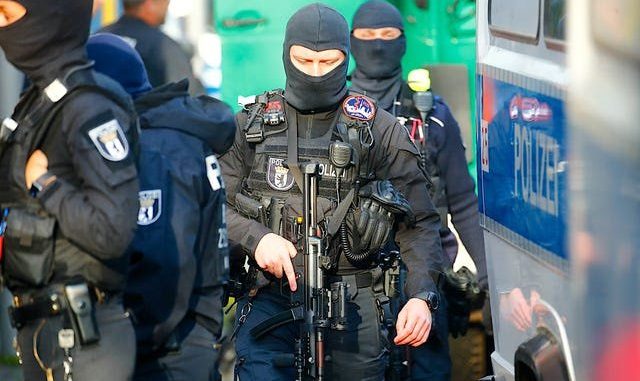
Hundreds of German counter-terrorism units and police fanned out across the country on Thursday, entering mosques, homes and religious associations in an investigation of 1,050 people suspected of links to the Lebanese militant group Hezbollah. The arrests and detentions were intended to question suspects as part of previously unannounced criminal cases.
The nationwide series of raids — the largest single anti-terrorism operation in years — came early Thursday after the Interior Ministry classified any activity linked to the powerful Shiite group as terror-related. The move was a break with previous European Union policy that differentiated between the group’s military and political wings.
Because of strict German privacy laws, prosecutors refused to say how many of the 1,050 had been detained or whether specific charges had been brought. One German security official confirmed the list to Insider and said that most faced questioning at this stage of the investigation, although they clarified some might already be facing charges that are currently being investigated.
The German security source, who does not have permission to brief the media on the issue, confirmed that the early morning raids had detained many of the top suspects on the list immediately. The official announcement said that arrests or detentions would continue “over the next few days.”
“We will find most of them,” the source said of the list of 1,050 names. “These are mostly legal residents who were not in hiding before the announcement.”
The focus of the raids are religious organizations that have openly raised money for the group
Hezbollah is widely considered the most powerful non-state actor in the Middle East. It has tens of thousands of fighters and a modern arsenal of weapons that have been deployed against Israel in the past, and are currently fighting alongside the Syrian regime of Bashar Assad in that country’s nearly decade-long civil war. Lebanon’s current government is composed of close allies of the group.
“Interior Minister Horst Seehofer has banned the Shiite terrorist organisation Hezbollah in Germany,” a ministry spokesman tweeted Thursday morning as the raids got underway.
“The organization is therefore fundamentally against the concept of international understanding, regardless of whether it presents itself as a political, social or military structure,” the Interior Ministry statement said, according to the Reuters news service.
The move came after years of pressure from the United States and Israel, who draw little distinction between Hezbollah’s military and political activities.
The main focus of Thursday’s raids appeared to be a series of religious organizations based in multiple German states that have openly raised money and pushed for political support for the group, which commands significant support from the Lebanese diaspora around the world. Israel and the United States have long pushed countries around the world to target Hezbollah’s vast fundraising and logistical support networks, most commonly in Europe, Africa and South America, with varying degrees of success.
“This was a push by the US and Israelis to pressure Iran and Hezbollah via some of their previously safe havens in Europe,” said a Belgian counter-terrorism official who has worked in Africa monitoring the group’s involvement in diamond and other natural resource trade. The source cannot be named because they frequently work undercover.
“The Germans went along with it because they realized how much activity was going on and it was an easier way to pressure Iran over the nuclear deal and make the US happy compared to some of the steps the Americans want, like re-imposing massive sanctions that Germany, and much of Europe, have so far resisted,” the source said.
*story by Business Insider